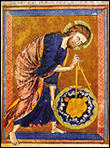Meeting with the Representatives of the World of Culture in the University of Pavia
Rector Magnificent,
Distinguished Professors,
Dear Students,
Although it is brief, my Pastoral Visit to Pavia could not leave out a stop at this University, which has been a hallmark of your City for centuries.
I am therefore glad to find myself among you for this encounter, to which I attribute special importance since I also come from the academic world.
I greet with cordial respect the professors, and in the first place, Prof. Angiolino Stella, whom I thank for his courteous words. I greet the students, especially the young man who expressed the sentiments of the other university students. He reassured me of your courage in dedication to the truth, of your courage in seeking beyond the limits of the known and not surrendering to the weakness of reason. And I am very grateful to him for these words.
I also extend my good wishes to all the members of your academic community who were prevented from being present here today.
Your University is one of the oldest and most distinguished of the Italian Universities and - I repeat the words of the Rector Magnificent - among the teachers who have honoured it are figures such as Alessandro Volta, Camillo Golgi and Carlo Forlanini.
I am also eager to recall that teachers and students marked by an eminent spiritual stature have passed through your Athenaeum. They were: Michele Ghislieri, who later became Pope St Pius V, St Charles Borromeo, St Alessandro Sauli, St Riccardo Pampuri, St Gianna Beretta Molla, Bl. Contardo Ferrini and the Servant of God Teresio Olivelli.
Dear friends, every university has an inherent community vocation: indeed, it is, precisely, a universitas, a community of teachers and students committed to seeking the truth and to acquiring superior cultural and professional skills.
The centrality of the person and the community dimension are two co-essential poles for an effective structuring of the universitas studiorum.
Every university must always preserve the traits of a study centre "within man's reach", where the student is preserved from anonymity and can cultivate a fertile dialogue with his teachers from which he draws an incentive for his cultural and human growth.
From this structure derive certain applications that are connected to one another. First of all, it is certain that only by putting the person at the centre and making the most of dialogue and interpersonal relations can the specializing fragmentation of disciplines be overcome and the unitive perspective of knowledge be recovered.
Naturally, and also rightly, the disciplines tend to specialization, while what the person needs is unity and synthesis.
Secondly, it is fundamentally important that the commitment to scientific research be open to the existential question of meaning for the person's life itself. Research seeks knowledge, whereas the person also needs wisdom, that knowledge, as it were, which is expressed in the "knowing-living".
In the third place, only in appreciating the person and interpersonal relationships can the didactic relationship become an educational relationship, a process of human development. Indeed, the structure gives priority to communication while people aspire to sharing.
I know that this attention to the person, his integral experience of life and his aspiration to communion are very present in the pastoral action of the Church of Pavia in the field of culture. This is witnessed to by the work of University Colleges of Christian inspiration.
Among these, I too would like to recall the Collegio Borromeo, desired by St Charles Borromeo with Pope Pius IV's Bull of foundation, and the Collegio Santa Caterina, founded by the Diocese of Pavia to comply with the wishes of the Servant of God Paul VI, with a crucial contribution from the Holy See.
In this sense, the work of the parishes and ecclesial movements is also important, especially that of the Diocesan University Centre and the Italian Catholic University Students' Association (FUCI).
The purpose of their activity is to welcome the person in his totality, to propose harmonious processes of human, cultural and Christian formation, and to provide spaces for sharing, discussion and communion.
I would like to take this opportunity to ask both students and teachers not to feel that they are merely the object of pastoral attention but to participate actively and to make their contribution to the cultural project of Christian inspiration which the Church promotes in Italy and in Europe.
In meeting you, dear friends, the thought of Augustine, Co-Patron of this University together with St Catherine of Alexandria, springs spontaneously to mind. Augustine's existential and intellectual development witnesses to the fertile interaction between faith and culture.
St Augustine was a man driven by a tireless desire to find the truth, to find out what life is, to know how to live, to know man. And precisely because of his passion for the human being, he necessarily sought God, because it is only in the light of God that the greatness of the human being and the beauty of the adventure of being human can fully appear.
At first, this God appeared very remote to him. Then Augustine found him: this great and inaccessible God made himself close, one of us. The great God is our God, he is a God with a human face. Thus, his faith in Christ did not have its ultimate end in his philosophy or in his intellectual daring, but on the contrary, impelled him further to seek the depths of the human being and to help others to live well, to find life, the art of living.
This was his philosophy: to know how to live with all the reason and all the depths of our thought, of our will, and to allow ourselves to be guided on the path of truth, which is a path of courage, humility and permanent purification.
Faith in Christ brought all Augustine's seeking to fulfilment, but fulfilment in the sense that he always remained on the way. Indeed, he tells us: even in eternity our seeking will not be completed, it will be an eternal adventure, the discovery of new greatness, new beauty.
He interpreted the words of the Psalm, "Seek his face continually", and said: this is true for eternity; and the beauty of eternity is that it is not a static reality but immense progress in the immense beauty of God.
Thus, he could discover God as the founding reason, but also as love which embraces us, guides us and gives meaning to history and to our personal life.
This morning I had the opportunity to say that this love for Christ shaped his personal commitment. From a life patterned on seeking, he moved on to a life given totally to Christ and thus to a life for others.
He discovered – this was his second conversion – that being converted to Christ means not living for oneself but truly being at the service of all.
May St Augustine be for us and also for the academic world a model of dialogue between reason and faith, a model of a broad dialogue which alone can seek truth, hence, also peace.
As my venerable Predecessor, John Paul II commented in his Encyclical Fides et Ratio: "The Bishop of Hippo succeeded in producing the first great synthesis of philosophy and theology, embracing currents of thought both Greek and Latin. In him too the great unity of knowledge, grounded in the thought of the Bible, was both confirmed and sustained by a depth of speculative thinking" (n. 40).
I therefore invoke the intercession of St Augustine, so that the University of Pavia may always be distinguished by special attention to the individual, by an accentuated community dimension in scientific research and by a fruitful dialogue between faith and culture.
I thank you for your presence and as I wish you every good for your studies, I impart to you all my Blessing, which I extend to your relatives and loved ones.





